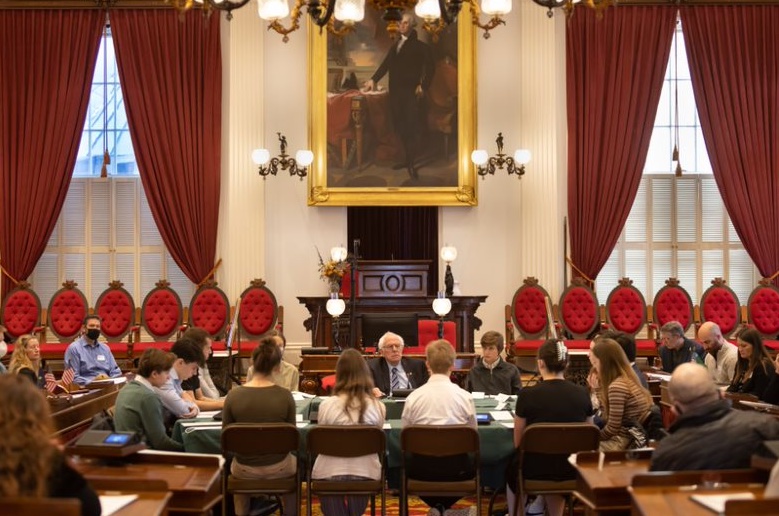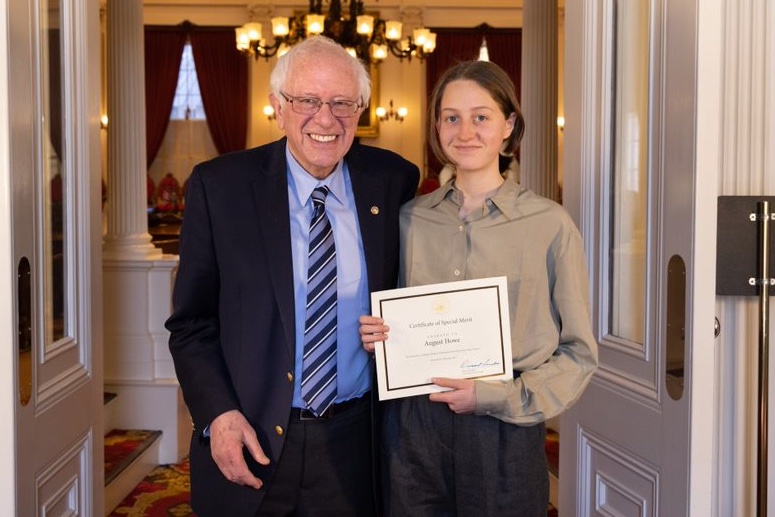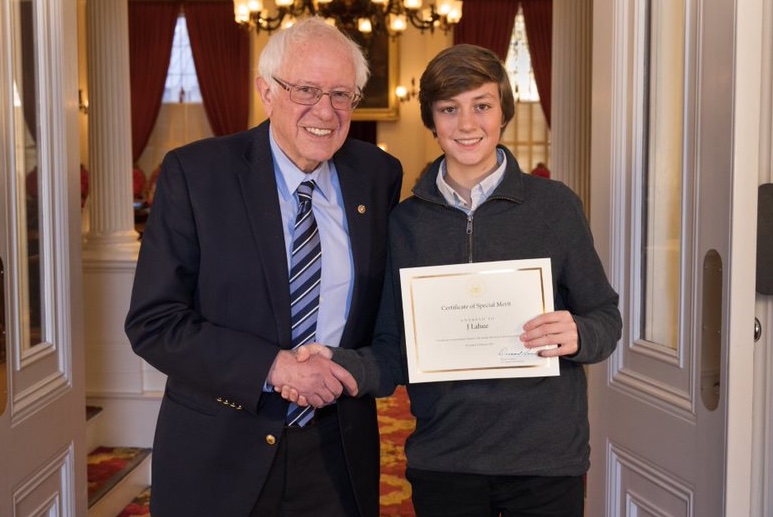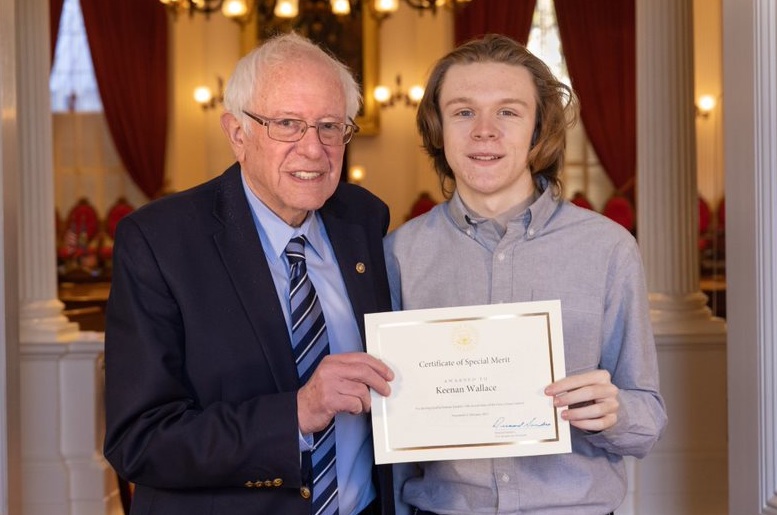|

|
|
Young Vermonters on the
“State of Our Union” |
|
Dear Fellow Vermonter,
Every year, for more than a decade now, I have held an annual essay contest for Vermont high school students on the “State of the Union.” The purpose is to try to get young people across our state thinking about the many issues we face as a nation, what the solutions might be, and what they would say if they were President of the United States giving the State of the Union address to the Congress and the country.
This year, nearly 400 students from 31 Vermont high schools submitted essays on many, many important issues. After the winners were chosen by an independent group of Vermont teachers, I had the opportunity to sit down with the 15 leading finalists for a round table discussion at the State House. I don’t know about them, but I had a lot of fun.
|
|

|
|
At the end of the discussion I asked the students what they had learned.
One student responded: “Government is a complicated thing.”
I couldn’t agree more.
I want to thank every student who participated in the essay contest. We should all be very proud of their efforts.
Below are the top 3 winning essays. I hope you take a moment to read them. To read the essays of all the finalists, click here. To watch the full roundtable discussion, click here.
Sincerely,

|
|
1st Place: August Howe
Junior, Twinfield Union School |
|
 |
|
This past Sunday, January 8th, 2023, rioters stormed official capitol buildings in Brazil. The incident parallels in many ways the January 6th attack on the U.S. capitol, the two-year anniversary of which had passed just two days prior to the Brazil riot. Both events were caused, in part, by misinformation campaigns waged primarily on social media platforms. Both instances are extreme examples of what can happen when misinformation forces people into action against problems that don't exist. Both instances are proof as to why the rise of misinformation and fake news on social media is one of the major problems facing our country.
The past twenty-five years have seen the rise of the internet and subsequent social media platforms. Starting out as a place to connect with people on a personal level, these platforms have grown to dominate the online landscape and now serve as many people's primary source of information. They have strayed from their original purpose, developing into money generating machines that rely on user's constant engagement. Tapping into people's psychology is the main way social media platforms and those on it obtain such participation, and unfortunately, negative and emotionally-manipulating content is what gains the most attraction. As a result, social media platforms breed negativity, division, and ultimately, distorted opinions that turn into mis- and disinformation and fake news on just about every subject out there.
The solution to such a problem is complicated and far from perfect, but there are still a few options. Social media platforms are essentially news sources at this point, yet they are not held to the same legal standards. News sources are liable for the content they release, social media platforms, however, are exempt from such liability by Section 230, a law passed by the U.S. Congress that protects all providers and users of interactive computer services from liability for the content on these platforms, regardless of whether it is true or false (Electronic Frontier Foundation). Originally created to protect internet user's speech, Section 230 now enables people to exercise their freedom of speech and introduce mis- and disinformation into the media stream without consequence. By repealing Section 230 and holding social media companies responsible for the content on their platforms, we will hold them to the same standards as established news outlets, and force them to do more to stop the spread of misinformation on their platforms.
Equally as important as holding companies accountable is encouraging the education of the general public on media literacy and critical thinking skills to identify misinformation and fake news. An educated population is essential to a well-governed population, and that education must now include media literacy. Programs should be implemented in schools, starting as young as elementary students, to teach how to identify fake news and be media literate.
Regulating social media platform like standard news outlets, and educating the general population are the best ways we can defend our country’s democracy from the threat of misinformation in social media.
|
|
2nd Place: J Lahue
Freshman, Burr & Burton Academy |
|
 |
|
Political polarization, or the divergence of political beliefs away from the center towards ideological extremes, is a prominent problem and a threat to democracy. Americans continue to create more divides between people who have opposing views, and the result, an astounding lack of empathy plagues our country. The 2019 government shutdown and the violent January 6th insurrection were both major consequences that stemmed from political polarization. This rise of extreme ideologies can be attributed to various factors, such as media partisanship, hostility between political opponents, and economic inequality. These factors then lead to congressional gridlock, lack of trust, an increase in violence, and, most importantly, a lessened sense of community. But, there are steps that, if taken, could stop polarization at its roots.
To solve political polarization, I propose a new bill, titled The Unity Act, to address the underlying problems. This bill would create forums to unify people and cultivate common ground by promoting dialogue and understanding and addressing economic inequality. While political polarization is a scary threat to democracy and the nation we live in, we can bridge the divides with the following measures.
The first way the bill would eliminate polarization is by targeting economic inequality. By increasing the minimum wage to just 10 dollars and 10 cents, around 4 million people would be taken out of poverty. Similarly, investing in education, especially Pre-K, would improve economic mobility. Furthermore, The Unity Act would expand the Earned Income Tax Credit to bring children above the poverty line. These reforms would solve economic inequality, a major cause of extreme ideologies because inequality leads to social divisions.
With the investment in education, the bill would also encourage middle schools to teach media literacy and how to differentiate between fake and factual information. Teaching this important skill at a young age would lessen the negative effects of misinformation. The bill would also recommend schools teach tough topics to create more dialogue and thus reduce the risk of extreme partisan views.
While these reforms would address the underlying problems, the major initiative would target polarization through Citizen Assemblies. Citizen Assemblies would be held in the counties of each state monthly. They would bring people together to speak about divisive issues that need to be addressed. Assemblies would select participants in the same way as jury duty so they could engage in political deliberation with their ideas directed towards the state and national government. These assemblies would effectively establish common ground to reduce extreme partisan views.
In conclusion, political polarization is an increasing problem that undermines democracy through issues like lack of trust and a lost sense of unity. By correcting economic inequalities, bettering the education system, and introducing Citizen Assemblies, polarization can be slowly eliminated. If passed, The Unity Act would create a bridge to improve the welfare of American citizens by cultivating common ground. Especially as newer and more partisan issues emerge, it is imperative that we strive towards a more cohesive nation by addressing political polarization.
|
|
3rd Place: Keenan Wallace
Junior, Twinfield Union School |
|
 |
|
One of the most pressing issues facing our society today is the issue of labor rights. Recently there has been a slew of confrontations between workers and corporations, from Starbucks and Amazon to the threatened rail strikes earlier this year, 2022 has been tumultuous. The way that each of these confrontations were negotiated either within the corporation or, in the case of the rail strikes, by the United States government sends an important message, our workers’ rights are not the priority.
In November of this year Starbucks employees organized a walkout at more than 100 Starbucks locations in protest of Starbucks repeated refusal to negotiate contracts with labor unions. Many workers cited being underpaid, understaffed and overworked. But Starbucks has been adamant in their anti-union stance, giving pay increases selectively to locations that had not voted to unionize, firing union organizers, refusing to negotiate contracts with union representatives, and taking steps to prohibit union elections at its stores. Unfortunately, this union busting attitude is not exclusive to Starbucks. At Amazon, one of the world's largest corporations, the same issues repeat themselves. Low pay, oppressive and, at times unsafe working conditions, as well as aggressive antiunion policies are also apparent there.
Earlier this year the 12 largest rail unions threatened to strike in protest of low pay and a lack of paid sick leave. Because of the massive economic impact a strike like this would have the US government stepped in. In November President Biden brokered a deal between the major rail unions and the rail corporations. This deal promises a 24% wage increase over the next five years, but it critically lacks any guaranteed paid sick days. This lack of sick days led four of the 12 major unions to reject the deal. Despite this Biden stepped in and asked Congress to impose the deal onto the Unions, disregarding their decision. This sets a precedent for corporations like Starbucks and Amazon to disregard labor unions.
The framework for the solution is already in place. The NLRB is an agency that was created to enforce the NLRA (National Labor Rights Act). This agency is responsible for helping organize unions and they step in when corporations violate the NLRA. Unfortunately, the NLRB is tremendously underfunded and since 2014 it has received no budget increases, resulting in an effective budget cut of more than 20% due to inflation. Additionally, under the Trump administration the agency's leadership was gutted, further challenging the fight for unionization. Under Biden the NLRB's performance has increased, but it is not enough. By increasing the NLRB's funding, its ability to organize unions, achieve justice for wronged workers and keep corporations in check would increase dramatically.
Increasing funding for the NLRB is a simple, low cost solution to a problem that has plagued the American working class for decades. A stronger NLRB would not only be a boon for workers, but also a valuable tool for the government to check the ever-increasing power that corporations hold over our democracy.
|
|
How Can We Help?
My Vermont offices have experienced caseworkers on staff who help Vermonters navigate federal agencies every day. If you think my office can help, please do not hesitate to call 1-800-339-9834 or click here.
If you would like to share your thoughts on pending legislation, or if you have an idea that we could address through new legislation, click here.
Receiving this email as a forward? Click here to sign up for the Bernie Buzz. |
|
|
|
|
 
|
|